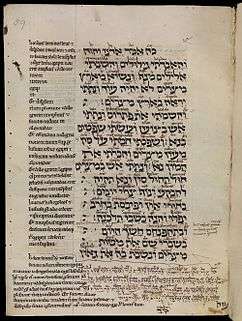Ezekiel 17
Ezekiel 17 is the seventeenth chapter of the Book of Ezekiel in the Hebrew Bible or the Old Testament of the Christian Bible. This book contains the prophecies attributed to the prophet/priest Ezekiel, and is one of the Books of the Prophets. This chapter tells (verses 1-10), and then interprets (verses 11-21), the riddle of the great eagle.[1]
| Ezekiel 17 | |
|---|---|
 Book of Ezekiel 30:13–18 in an English manuscript from the early 13th century, MS. Bodl. Or. 62, fol. 59a. A Latin translation appears in the margins with further interlineations above the Hebrew. | |
| Book | Book of Ezekiel |
| Hebrew Bible part | Nevi'im |
| Order in the Hebrew part | 7 |
| Category | Latter Prophets |
| Christian Bible part | Old Testament |
| Order in the Christian part | 26 |
Text
The original text of this chapter is written in the Hebrew language. This chapter is divided into 24 verses.
Textual witnesses
Some early manuscripts containing the text of this chapter in Hebrew are of the Masoretic Text tradition, which includes the Codex Cairensis (895), the Petersburg Codex of the Prophets (916), Aleppo Codex (10th century), Codex Leningradensis (1008).[2]
There is also a translation into Koine Greek known as the Septuagint, made in the last few centuries BC. Extant ancient manuscripts of the Septuagint version include Codex Vaticanus (B; B; 4th century), Codex Alexandrinus (A; A; 5th century) and Codex Marchalianus (Q; Q; 6th century).[3][lower-alpha 1]
Verse 2
- Son of man, put forth a riddle,
- and speak a parable unto the house of Israel.[5]
"Son of man" (Hebrew: בן־אדם ben-adam): this phrase is used 93 times to address Ezekiel.[6]
"Riddle" (Hebrew: חידה hidah): the Hebrew word has a meaning of "dark, obscure utterance",[7] requiring interpretation; the passage is also called a "parable", as containing a similitude (Hebrew: משל mashal) or comparison.[8][9][1]
The eagle is Nebuchadnezzar, king of Babylon. Conquerors are also compared to an eagle in:
- Deuteronomy 28:49;
- Isaiah 46:11;
- Jeremiah 4:13;
- Jeremiah 48:40;
- Hosea 8:1;
- Lamentations 4:19.[1]
Verse 9
- “Say, ‘Thus says the Lord God:
- “Will it thrive?
- Will he not pull up its roots,
- Cut off its fruit,
- And leave it to wither?
- All of its spring leaves will wither,
- And no great power or many people
- Will be needed to pluck it up by its roots.”’” (NKJV)[10]
Verse 16
- As I live, saith the Lord God, surely in the place where the king dwelleth that made him king, whose oath he despised, and whose covenant he brake, even with him in the midst of Babylon he shall die.[12]
- The prophecy was fulfilled when Zedekiah died in the prison in Babylon (2 Kings 25:6,7; Jeremiah 39:7; Jeremiah 52:11).[13]
Verse 23
- On the mountain height of Israel I will plant it;
- and it will bring forth boughs, and bear fruit, and be a majestic cedar.
- Under it will dwell birds of every sort;
- in the shadow of its branches they will dwell.[14]
This "messianic allegory" is presented with the reference to the "branch" in Isaiah 11:1; Jeremiah 23:5-6; Zechariah 3:8, which grows to be "a majestic cedar."[15]
As shown in the Daily Mass Readings provided in the Latin Rite of the Roman Catholic Church, one of the main references in the Gospels is the Parable of the Mustard Seed (Mark 4:30-32).[16]
See also
- Related Bible parts: 2 Kings 24, 2 Chronicles 36, Isaiah 11, Jeremiah 37, Jeremiah 52, Ezekiel 29, Ezekiel 30, Matthew 13
Notes
- Ezekiel is missing from the extant Codex Sinaiticus.[4]
References
- Davidson, Andrew B., Cambridge Bible for Schools and Colleges on Ezekiel 17, accessed 23 November 2019
- Würthwein 1995, pp. 35-37.
- Würthwein 1995, pp. 73-74.
- Shepherd, Michael (2018). A Commentary on the Book of the Twelve: The Minor Prophets. Kregel Exegetical Library. Kregel Academic. p. 13. ISBN 978-0825444593.
- Ezekiel 17:2
- Bromiley 1995, p. 574.
- Brown, Driver & Briggs 1906, p. 295.
- Brown, Driver & Briggs 1906, p. 605.
- Gesenius 1979 "מָשָׁל"
- Ezekiel 17:9
- Rashi's Commentary on Ezekiel 17:9.
- Ezekiel 17:16 NKJV
- Huey 1993, p. 343.
- Ezekiel 17:23 NKJV
- The New Oxford Annotated Bible with the Apocrypha, Augmented Third Edition, New Revised Standard Version, Indexed. Michael D. Coogan, Marc Brettler, Carol A. Newsom, Editors. Publisher: Oxford University Press, USA; 2007. pp. 1201-1203 Hebrew Bible. ISBN 978-0195288810
- "Daily Mass Readings - 17 June 2018 – Sunday". catholicgallery.org. Archived from the original on 20 November 2018. Retrieved 20 November 2018.
Bibliography
- Bromiley, Geoffrey W. (1995). International Standard Bible Encyclopedia: vol. iv, Q-Z. Eerdmans.CS1 maint: ref=harv (link)
- Brown, Francis; Driver, S. R.; Briggs, Charles A. (1906). The Brown-Driver-Briggs Hebrew and English Lexicon (1939 reprint ed.). Oxford University Press.CS1 maint: ref=harv (link)
- Clements, Ronald E (1996). Ezekiel. Westminster John Knox Press. ISBN 9780664252724.CS1 maint: ref=harv (link)
- Gesenius, H. W. F. (1979). Gesenius' Hebrew and Chaldee Lexicon to the Old Testament Scriptures: Numerically Coded to Strong's Exhaustive Concordance, with an English Index. Translated by Tregelles, Samuel Prideaux (7th ed.). Baker Book House.
- Huey, F. B. (1993). The New American Commentary - Jeremiah, Lamentations: An Exegetical and Theological Exposition of Holy Scripture, NIV Text. B&H Publishing Group. ISBN 9780805401165.
- Joyce, Paul M. (2009). Ezekiel: A Commentary. Continuum. ISBN 9780567483614.CS1 maint: ref=harv (link)
- Würthwein, Ernst (1995). The Text of the Old Testament. Translated by Rhodes, Erroll F. Grand Rapids, MI: Wm. B. Eerdmans. ISBN 0-8028-0788-7. Retrieved January 26, 2019.